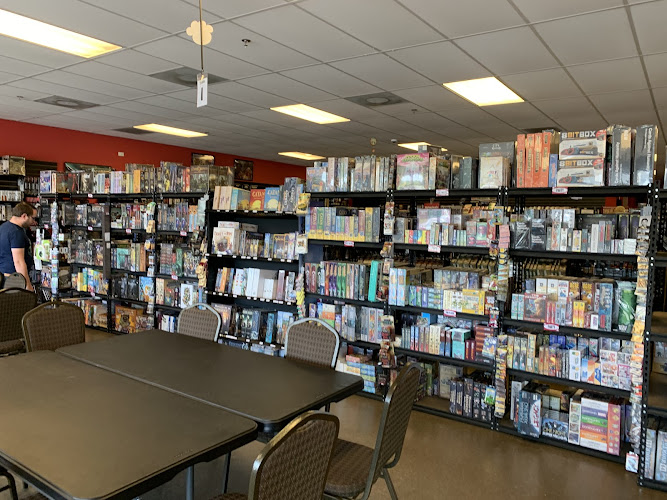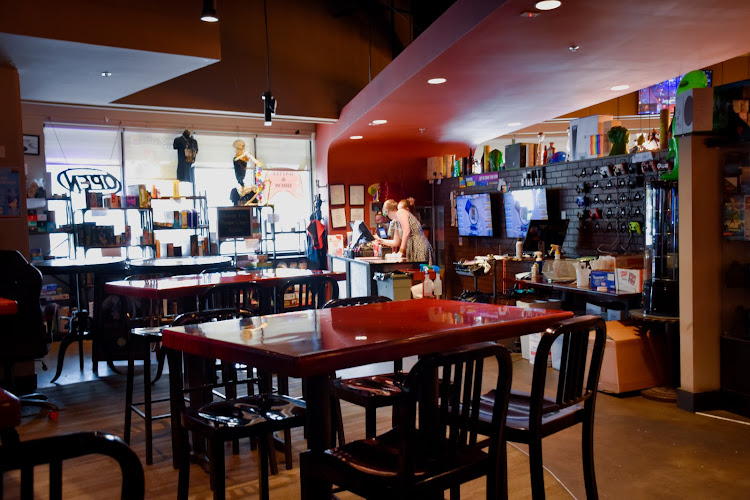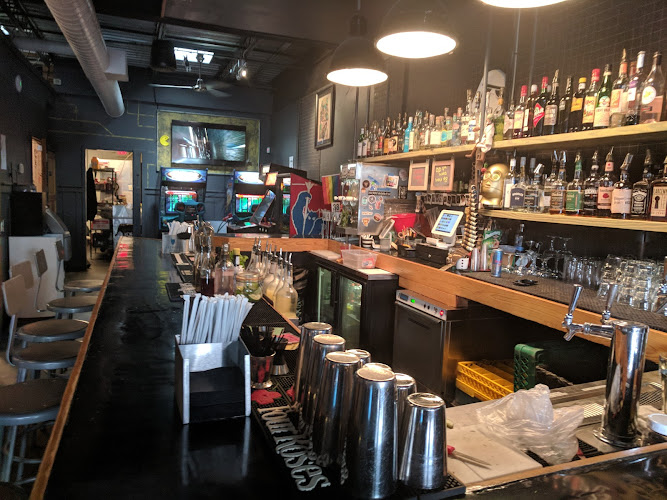

In a city better known for its traffic patterns that resemble a game of Hungry Hungry Hippos played by toddlers hopped up on Mountain Dew, Atlanta has somehow cultivated a board game scene worth discussing in polite company. The metropolis that can’t decide if it’s the capital of the New South or just the capital of people who’ve given up on finding parking downtown now offers sanctuaries where dice can be rolled without judgment and victory points can be accumulated without having to navigate Spaghetti Junction.
Hiding in Marietta like a rogue character with high stealth stats, Giga-Bites has established itself as Atlanta’s premier destination for those who prefer their entertainment accompanied by rule books thicker than Georgia humidity.
Walking into Giga-Bites feels like entering that one friend’s basement who’s been collecting games since the ’90s, except with better lighting and significantly less mysterious dampness. The café portion offers sustenance that rises admirably above the “microwaved gas station fare” bar that so many gaming establishments seem to consider aspirational. Their sandwich menu alone deserves recognition for acknowledging that gamers occasionally require nutrients beyond those found in Doritos dust.
The staff possess that unique ability to explain complex game rules clearly while somehow making you feel neither patronized nor overwhelmed—a skill set approximately as rare as finding a parking space at Ponce City Market on a Saturday.

Located in Sandy Springs—that peculiar zone where Atlanta pretends it doesn’t want to be Atlanta until tax season—Battle and Brew proudly proclaims itself America’s first video game restaurant. This is like being America’s first combination laundromat/ice cream parlor: not something anyone asked for, but now that it exists, we can’t imagine life without it.
Battle and Brew occupies that perfect sweet spot between “too nerdy for normies” and “too mainstream for hardcore gamers,” resulting in a space where everyone feels simultaneously comfortable and slightly out of their depth. It’s the gaming equivalent of your first job after college—you’re not entirely sure you belong there, but everyone’s too busy with their own concerns to notice your impostor syndrome.
Note: While Battle and Brew offers tabletop gaming options, it leans more heavily toward the video game side of the spectrum, making it the digital-analog equivalent of that friend who claims to enjoy both reading books and watching their movie adaptations but clearly prefers the latter.

Nestled in Atlanta’s Edgewood district like a vintage Pac-Man cabinet in a modern arcade, Joystick Gamebar combines the city’s love of craft beverages with its slightly more hidden love of public competition. It’s what would happen if your childhood arcade grew up, developed a drinking problem, but then channeled that into becoming a certified mixologist.
Joystick manages to thread the needle between “hipster pretension” and “genuine nostalgia” with surprising deftness. The bar attracts a crowd diverse enough to make a corporate HR brochure photographer weep with joy—tech bros, artists, middle-aged couples on date night, and twentysomethings who can’t remember a world without WiFi all coexist in harmony, united by their shared inability to beat the high score on Centipede.
Note: While Joystick offers some tabletop options, it’s primarily focused on arcade gaming, making it the board game equivalent of that person who says they’re “totally into gaming” but really just plays Mario Kart at parties.

Atlanta’s board game scene has developed with the same irregular pattern as the city’s street grid—seemingly random at first glance but revealing a certain logic once you’ve lived here long enough to develop Stockholm syndrome toward the traffic. Unlike cities with dozens of dedicated gaming venues, Atlanta has condensed its offerings into a few high-quality locations that serve as cultural waystations in a metropolitan area where “neighborhoods” and “cities” blur together like the distinction between “rush hour” and “regular traffic.”
What’s remarkable about Atlanta’s gaming establishments is how they reflect the city’s broader cultural identity crisis. Like Atlanta itself—perpetually caught between Southern tradition and cosmopolitan aspiration—these venues embrace both the inclusive warmth of Southern hospitality and the exclusionary joy of knowing obscure game rules that others don’t.
The limited number of venues has created micro-communities more tightly knit than the coziest hand-knit sweater from your grandmother. Regular patrons develop relationships that transcend the gaming table, forming bonds over shared experiences like arguing about rule interpretations, commiserating over Atlanta sports teams’ continued ability to snatch defeat from the jaws of victory, and collectively suffering through summers where stepping outside feels like entering a sauna fully clothed.
Dragon Con serves as the annual high holiday for Atlanta’s gaming community, transforming downtown hotels into a sprawling, chaotic board game utopia for one weekend each year. Hotel lobbies become impromptu gaming spaces where strangers bond over shared rulebooks, often while wearing elaborate costumes that make reading said rulebooks significantly more challenging.
Perhaps most importantly, these gaming venues provide essential shelter from Atlanta’s biblical summer heat. Nothing says “Southern gaming” quite like the silent agreement among players that no one acknowledges the sweat mustache everyone develops during the twelve-step walk from car to building entrance.
So whether you’re an Atlanta native who remembers when Atlantic Station was a steel mill, a transplant still baffled by the concept of “Cobb County,” or just visiting for a convention and wondering why your GPS keeps saying “recalculating,” the board game scene offers something uniquely Atlantan—a place where community forms around shared tables, where strangers become friends over borrowed dice, and where the only thing hotter than the summer temperature is the debate over optimal first-turn strategy.
In true Atlanta fashion, these venues exist as islands of air-conditioned comfort in a sea of parking lots and peach-themed street names, proving that sometimes the most meaningful connections happen offline, one dice roll at a time, in a city that still can’t figure out what to do with The Gulch but somehow knows exactly what to do with a Friday night.
